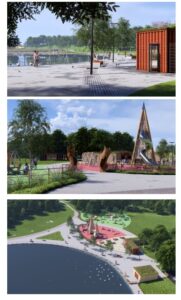Back to Digital Planning Programme Case Studies
Summary
North Tyneside Council revolutionised its public engagement approach by implementing a comprehensive digital platform that transformed how residents participate in consultations. Using PropTech Innovation funding, the council procured EngagementHQ, an off-the-shelf digital engagement solution from Granicus, whilst exploring cutting-edge visualisation technologies to make complex regeneration proposals more legible to residents.
Use of the technology delivered impressive results: participation increased significantly across previously under-represented demographics, with younger residents (under 35) showing 79% increased engagement and female residents participating 70% more. The platform’s streamlined processes generated 32% time savings per consultation, enabling staff to focus on meaningful community interaction rather than more administrative tasks.
Challenge
North Tyneside Council faced numerous challenges that impacted effective community engagement on its regeneration schemes and planning matters. The council’s fragmented approach using multiple digital tools created a disjointed and confusing user experience, making it difficult for residents to find relevant consultations or understand where to provide feedback. Limited visualisation capabilities meant complex regeneration plans and proposals were presented through PDF documents and static images, preventing residents from truly understanding the potential impact of developments on their local area.
The manual processes for analysing consultation feedback were inefficient and resource-intensive, creating delays in decision-making. Perhaps most significantly, the council struggled to engage certain demographics, particularly younger residents who were under-represented in planning consultations despite being most affected by long-term development decisions. Without a unified digital platform, the council couldn’t maintain consistent branding or user experience across different departments and consultation types, undermining trust and recognition amongst residents.
Approach
North Tyneside Council adopted a two-phase approach to address these engagement challenges.
Phase one focused on procuring and implementing EngagementHQ as a centralised consultation platform that would serve as the single digital hub for all council engagement activities. This platform featured interactive elements including pin-drop functionality allowing residents to comment on specific locations, quick polls for rapid feedback collection, and subscription services enabling residents to stay informed about topics of interest.
The platform revolutionised how complex planning information was presented through interactive project timelines, integrated document repositories, and map-enabled visualisations. Rather than making residents navigate different websites or understand complex technical documents, all consultation materials including documents, images, videos and supporting data were centralised in an accessible, user-friendly format.
Phase two involved comprehensive research into innovative visualisation technologies through collaboration with the Open Digital Planning community. The council engaged with suppliers including Esri to explore 3D visualisation capabilities and Digital Urban to understand immersive technologies including virtual reality applications. This research phase, whilst still in development during the case study period, identified significant strategic opportunities for creating more compelling consultations with rich visual assets that could help residents understand complex planning proposals.
The council adopted Agile project management methodologies to accommodate tight deadlines and remain flexible to emerging insights. Regular fortnightly team meetings ensured rapid problem-solving and knowledge sharing, whilst user research with resident panels provided crucial feedback to improve the engagement platform.
Results
The digital transformation delivered measurable improvements across engagement, demographic reach and efficiency.

Engagement results:
- Consultation participation increased dramatically, with residents aged 45-54 showing 168% increased engagement, those aged 35-44 participating 110% more, and under-35s increasing their participation by 79%. Female resident engagement increased by 70%, successfully addressing previous gender imbalances in planning consultations.
- The platform delivered average time savings of 32.2% per consultation across various tasks, enabling staff to focus on higher-value activities including deeper community engagement and analysis of resident feedback. Specific efficiency gains included 33.3% time savings on conducting in-person consultations and 50% time savings on analysing consultation responses.
Enhanced analytics and transparency:
- Integrated analytics dashboards replaced manual data collation processes, providing real-time insights into engagement patterns and resident preferences that enabled the council to continuously improve their engagement and outreach strategies.
- The centralised approach improved transparency by creating a single repository for all consultation materials and decision-making processes, delivering a unified ‘One Council’ experience for residents.
Vicki Nixon, Head of Community and Inclusion, at North Tyneside Council, said: “One of our biggest priorities as a local authority is to provide the best possible service for our residents – and that’s impossible to do without engaging with them and understanding their needs. Using Engagement HQ and having the platform to present this information and gather feedback all in one place has allowed us to get the views of more and more residents from different age groups and backgrounds.
“We recently ran our most recent Big Community Conversation using the system, which received over 1,269 submissions through the online platform which contributed to a 285% increase on the previous year. This increased consultation means we can shape our services and policies based on what our residents tell us. Making informed decisions using data and feedback, both positive and negative, to ensure we provide services that work for our residents and meet their needs. North Tyneside Council continue to explore innovative technologies alongside other service areas to bring project images to life following our Proptech success.”
Future opportunities
Research into visualisation technologies identified significant opportunities for creating more intuitive and engaging presentations of complex planning proposals, potentially leading to even greater community participation and more informed feedback in future consultations.
For more information
If you’re a Local Planning Authority looking to modernise planning processes and enhance digital skills and capabilities, explore joining the Open Digital Planning community to gain access to resources, peer support, and digital expertise.
 UK Ministry of Housing, Communities and Local Government (MHCLG)
UK Ministry of Housing, Communities and Local Government (MHCLG) 